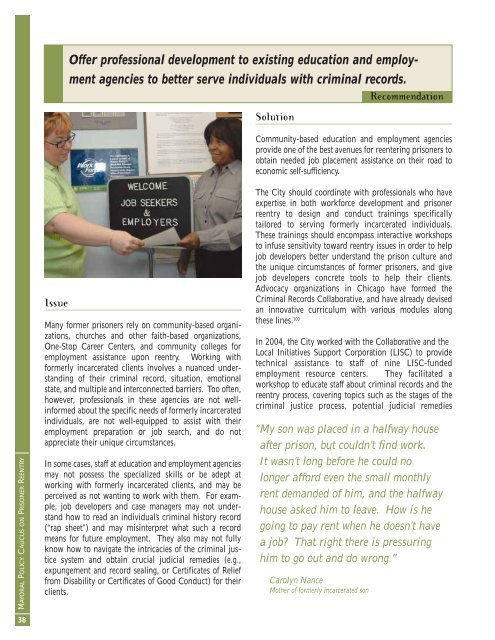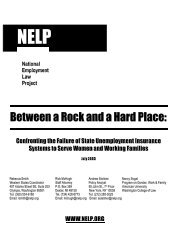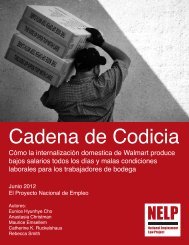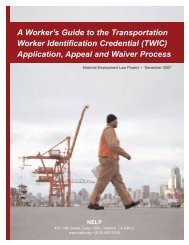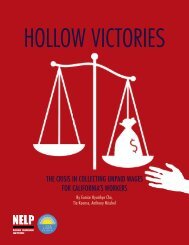Rebuilding Lives. Strengthening Communities.
Rebuilding Lives. Strengthening Communities.
Rebuilding Lives. Strengthening Communities.
Create successful ePaper yourself
Turn your PDF publications into a flip-book with our unique Google optimized e-Paper software.
Offer professional development to existing education and employment<br />
agencies to better serve individuals with criminal records.<br />
Recommendation<br />
Solution<br />
Community-based education and employment agencies<br />
provide one of the best avenues for reentering prisoners to<br />
obtain needed job placement assistance on their road to<br />
economic self-sufficiency.<br />
MAYORAL POLICY CAUCUS ON PRISONER REENTRY<br />
Issue<br />
Many former prisoners rely on community-based organizations,<br />
churches and other faith-based organizations,<br />
One-Stop Career Centers, and community colleges for<br />
employment assistance upon reentry. Working with<br />
formerly incarcerated clients involves a nuanced understanding<br />
of their criminal record, situation, emotional<br />
state, and multiple and interconnected barriers. Too often,<br />
however, professionals in these agencies are not wellinformed<br />
about the specific needs of formerly incarcerated<br />
individuals, are not well-equipped to assist with their<br />
employment preparation or job search, and do not<br />
appreciate their unique circumstances.<br />
In some cases, staff at education and employment agencies<br />
may not possess the specialized skills or be adept at<br />
working with formerly incarcerated clients, and may be<br />
perceived as not wanting to work with them. For example,<br />
job developers and case managers may not understand<br />
how to read an individual’s criminal history record<br />
(“rap sheet”) and may misinterpret what such a record<br />
means for future employment. They also may not fully<br />
know how to navigate the intricacies of the criminal justice<br />
system and obtain crucial judicial remedies (e.g.,<br />
expungement and record sealing, or Certificates of Relief<br />
from Disability or Certificates of Good Conduct) for their<br />
clients.<br />
The City should coordinate with professionals who have<br />
expertise in both workforce development and prisoner<br />
reentry to design and conduct trainings specifically<br />
tailored to serving formerly incarcerated individuals.<br />
These trainings should encompass interactive workshops<br />
to infuse sensitivity toward reentry issues in order to help<br />
job developers better understand the prison culture and<br />
the unique circumstances of former prisoners, and give<br />
job developers concrete tools to help their clients.<br />
Advocacy organizations in Chicago have formed the<br />
Criminal Records Collaborative, and have already devised<br />
an innovative curriculum with various modules along<br />
these lines. 100<br />
In 2004, the City worked with the Collaborative and the<br />
Local Initiatives Support Corporation (LISC) to provide<br />
technical assistance to staff of nine LISC-funded<br />
employment resource centers. They facilitated a<br />
workshop to educate staff about criminal records and the<br />
reentry process, covering topics such as the stages of the<br />
criminal justice process, potential judicial remedies<br />
“My son was placed in a halfway house<br />
after prison, but couldn’t find work.<br />
It wasn’t long before he could no<br />
longer afford even the small monthly<br />
rent demanded of him, and the halfway<br />
house asked him to leave. How is he<br />
going to pay rent when he doesn’t have<br />
a job That right there is pressuring<br />
him to go out and do wrong.”<br />
Carolyn Nance<br />
Mother of formerly incarcerated son<br />
38


